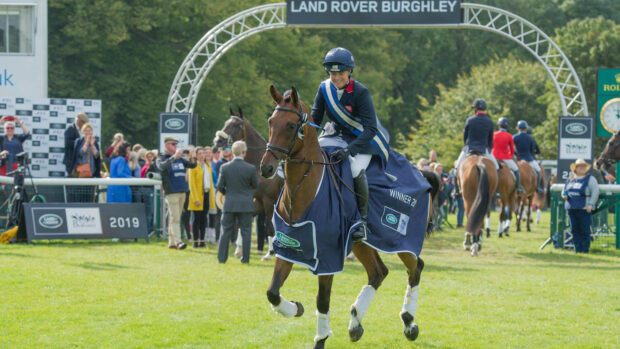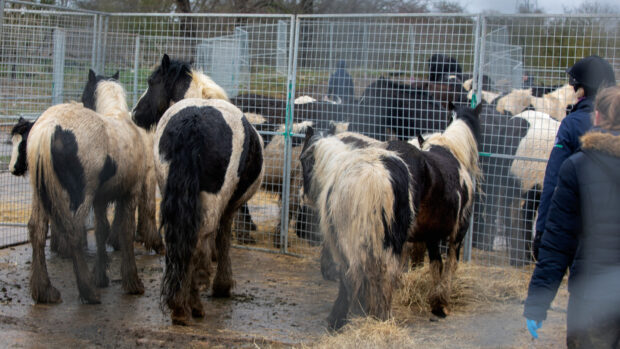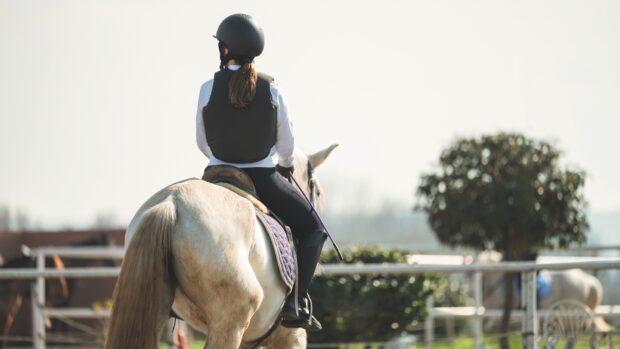THE results of a survey into public perception of equestrian sport should be a “wake-up call” to all in the industry – but if we take action and work together, we can overcome the challenges.
An independent survey commissioned by World Horse Welfare, conducted by YouGov from a representative sample of the public, found that 20% of respondents did not support the continued involvement of horses in sport, under any circumstances, and 40% only supported this if their welfare is improved.
Three in five people said there should be more safety and welfare measures in horse sports, and 16% felt their confidence in protection of horse welfare in sport had been affected negatively.
Announcing the results, World Horse Welfare chief executive Roly Owers said: “This is the first survey we have undertaken on this important subject, and the findings should be a wake-up call to everyone involved in equestrian sports that they are not as trusted with horse welfare as they need to be to maintain public support.
“I am afraid that the results of our survey reflect the reality of the UK public’s perception of welfare in horse sport, but we can and must turn this around.”
The charity organised a panel discussion of the issues, on 21 June. Chaired by former H&H editor Lucy Higginson, it featured top eventer Pippa Funnell, Madeleine Campbell, a senior lecturer in human-animal interactions and ethics at the Royal Veterinary College (RVC), Barry Johnson, chair of British racing’s Horse Welfare Board, Christian Landolt, a dressage and event rider, trainer and FEI ground jury member, and David Morley, chair of the Hurlingham Polo Association pony welfare committee.
Mr Owers said the purpose of the event was to highlight the challenges and opportunities around public perception of the welfare of horses in sport, and “explore how we can address them together”.
“World Horse Welfare supports the responsible use of horses in sport and for several years, we’ve been championing the concept that equestrianism can only flourish with public support, so long as it has a social licence to operate. But right now, there are emerging threats to that social licence, as the public doesn’t always trust us to protect the key stakeholder – the horse.”
Mr Owers said the charity had been aware of this anecdotally, from “headlines and social media”, and from discussions with people across the world, but wanted to find out “in a more evidence-based way, how the British public feels about horse sport”.
“The results should be an alarm call for everyone here today,” he said. “Some may dismiss these as uninformed opinions, but it might surprise you that even of those who had regular experience of horses in sport, 22 of 48 only supported continued involvement of horses if their welfare is improved, and some eight didn’t support it under any circumstances. So welfare concerns don’t only exist in people who don’t understand horses. The problem we have can’t be put down to perception alone.
“Today, we’re seeking to galvanise the equestrian community and offer our support on the way forward.”
He added: “My entreaty to you is to do more, faster, and work with each other to get it right,” adding that a major part of this is celebrating the unique horse-human partnership and how it benefits both parties involved.
Christian said he was not surprised by the survey results, and his own views were similar.
He said people should remember how much good work to improve welfare is being carried out by federations and that it is important to have consistent reminders of standards. And that recently, many dressage riders have had a major impact on perception by sharing pictures of horses hacking and turned out, on social media.
“But I’ve noticed at competitions, big discrepancies between how professionals and some amateurs manage their horses and the degree of horsemanship,” he said. “To me, there’s a lack of education and understanding of horses at times. These discrepancies worry me – when you walk around lorry parks and stables, some youngsters are happier on their phone than looking after their horses, who might be in need.
“With social media so prominent, we need to be careful, as bad news travels a lot faster than good. There needs to be a push on education.”
Pippa agreed on the influence of social media, adding that she is saddened by the way one person’s bad actions can “tarnish the rest of us”, and on education.
“One idea I’m keen on – at competitions, there can be very many riders and few stewards,” she said. “I feel there could be a system where respected riders could be there, maybe with an armband on, approachable for advice. It would put them in a position to say, ‘What you did there wasn’t right by the horse,’ and educate in a diplomatic way.”
Pippa also agreed on the need to celebrate the unique partnership of our sport, adding: “We’ve got to promote the love, care and attention that goes into these amazing animals.”
Dr Campbell believes much of boosting our social licence is around communication. She cited good work in racing, whereby many leading trainers open yards to the public, to let people see how the horses live, and also the value of “demonstrable and consistent decision-making”.
She also referred to the ethical decision-making model developed by World Horse Welfare and the RVC, the aim of which is to “help provide sporting disciplines with a consistent ethical basis for the participation of equines in sport and leisure, designed to support the highest standards of welfare”. One driver behind this was to be able to show the public that decisions are being made with horse welfare in mind.
“We also need to think about how we communicate with the public about the horse-human partnership,” Dr Campbell said. “There may be a bit of feeling that it can only be negative and I honestly don’t believe that’s true. When it’s well done, there’s definitely benefit to the horse and we need to explain that.”
Mrs Higginson asked whether it would be feasible to ask busy top riders to share more such positives on social media, and Pippa said “absolutely yes”.
“It’s amazing how we put posts up about results, but we get so much more following when you’re lying in the stable next to a horse with your arms round it,” she said, adding that social media can be an ideal platform to educate. And riders can help others know if they and their horses are ready to step up a competition level.
“Abuse of horses is not acceptable and I’ve got no problem with throwing the book, but with less experienced riders, it’s about education,” she said.
Mr Johnson said a challenge with media coverage is that it is the winners who are interviewed and “they’re not all as good as Pippa at expressing their opinions”. He believes it would be good to involve more farriers, grooms and younger riders, and give them media training to help them get the positive messages across.
A key message was different disciplines working together. As H&H has reported, many of the public do not see dressage or racing or pentathlon, they just see horse sport, so all are as much affected.
Dr Campbell said she believes this is starting to happen and it is important they involve all levels of the sport, from grassroots to elite. One issue she mentioned was discrepancies in rules and that if evidence-based reasoning cannot be found, “maybe we need to reconsider”.
Christian agreed with Pippa on the idea of riders backing stewards, saying the latter have a huge job, but “maybe sometimes they’re not brave enough to tackle a tough name… sometimes it’s easier to deal with a noseband that’s too tight than rough riding”.
He also questioned whether there should be an upper age limit for horses and whether riders, like officials, should have to sit annual exams on FEI rules.
Mr Owers added that we may not be able to change the minds of the 20%, but “we can influence the other 80%, whether they understand horses or not – and we need to, because their opinion, on whether we take care of our horses or not, will partly determine whether horse sport has a future”.
“We’re not creating a problem – concerns are growing and will only grow further if we don’t address them,” he said.
In conclusion, Mr Owers said the charity will follow up on the research and that we should make three commitments: to constantly challenge ourselves as to whether we can do more to prioritise our horses’ welfare; to review sports’ current practices and work together to make improvements that will directly benefit horse welfare; and to work with the media to promote the benefits of the horse-human partnership, focusing on the benefit to the horse.
“I think if we can commit to this and work together, we can ensure a very positive future for the horse-human partnership, which is the foundation of responsible horse sport,” he said. “I look forward to working with you on the journey ahead.”
You might also be interested in:

*Opinion* Scaremongering clickbait, or a very real threat to the sport we all love?

How to engage with public to ensure our sport survives

‘A wake-up call’: 20% of public do not support horses in sport, survey finds

Subscribe to Horse & Hound magazine today – and enjoy unlimited website access all year round
Horse & Hound magazine, out every Thursday, is packed with all the latest news and reports, as well as interviews, specials, nostalgia, vet and training advice. Find how you can enjoy the magazine delivered to your door every week, plus options to upgrade your subscription to access our online service that brings you breaking news and reports as well as other benefits.




